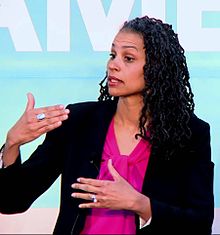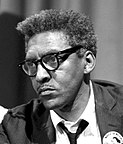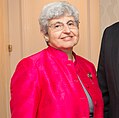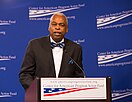
Bayard Rustin was an American political activist, a prominent leader in social movements for civil rights, socialism, nonviolence, and gay rights. Rustin was the principal organizer of the March on Washington for Jobs and Freedom in 1963.

Asa Philip Randolph was an American labor unionist and civil rights activist. In 1925, he organized and led the Brotherhood of Sleeping Car Porters, the first successful African-American-led labor union. In the early Civil Rights Movement and the Labor Movement, Randolph was a prominent voice. His continuous agitation with the support of fellow labor rights activists against racist labor practices helped lead President Franklin D. Roosevelt to issue Executive Order 8802 in 1941, banning discrimination in the defense industries during World War II. The group then successfully maintained pressure, so that President Harry S. Truman proposed a new Civil Rights Act and issued Executive Orders 9980 and 9981 in 1948, promoting fair employment and anti-discrimination policies in federal government hiring, and ending racial segregation in the armed services.
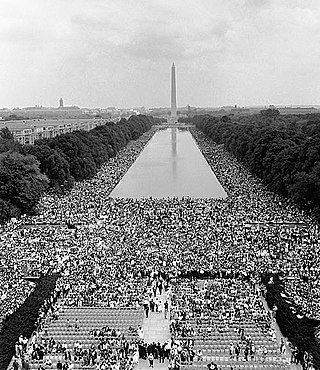
The March on Washington for Jobs and Freedom, also known as simply the March on Washington or the Great March on Washington, was held in Washington, D.C., on August 28, 1963. The purpose of the march was to advocate for the civil and economic rights of African Americans. At the march, final speaker Dr. Martin Luther King Jr., standing in front of the Lincoln Memorial, delivered his historic "I Have a Dream" speech in which he called for an end to racism and racial segregation.
Ralph G. Neas is an American civil rights activist and executive. He is best known for directing a series of national campaigns to strengthen and protect civil rights laws during the Reagan and Bush presidencies. He is also known for chairing the national coalition that helped defeat the U.S. Supreme Court nomination of Robert Bork.

Roy Ottoway Wilkins was a prominent activist in the Civil Rights Movement in the United States from the 1930s to the 1970s. Wilkins' most notable role was his leadership of the National Association for the Advancement of Colored People (NAACP), in which he held the title of Executive Secretary from 1955 to 1963 and Executive Director from 1964 to 1977. Wilkins was a central figure in many notable marches of the civil rights movement and made contributions to African-American literature. He controversially advocated for African-Americans to join the military.

Lesbian, gay, bisexual and transgender (LGBT) rights in the United States rank among the most advanced in the world, with public opinion and jurisprudence changing significantly since the late 1980s.
The Lawyers' Committee for Civil Rights Under Law, or simply the Lawyers' Committee, is an American civil rights organization founded in 1963 at the request of President John F. Kennedy.
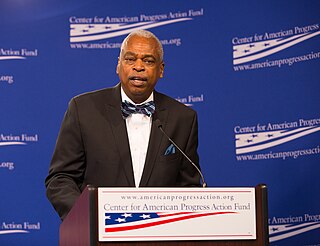
Wade J. Henderson is an African-American advocate, community leader and governmental activist. He has served as president of the Leadership Conference on Civil and Human Rights (LCCHR) and counsel to the Leadership Conference Education Fund.

The Civil Rights Division of the United States Department of Justice enforces federal statutes prohibiting discrimination on the basis of race, sex, disability, religion, and national origin.

Marc Rotenberg is president and founder of the Center for AI and Digital Policy, an independent non-profit organization, incorporated in Washington, D.C. Rotenberg is the editor of The AI Policy Sourcebook, a member of the OECD Expert Group on AI, and helped draft the Universal Guidelines for AI. He teaches the GDPR and privacy law at Georgetown Law and is coauthor of Privacy Law and Society and The Privacy Law Sourcebook (2020). Rotenberg is a founding board member and former chair of the Public Interest Registry, which manages the .ORG domain.

The Lilly Ledbetter Fair Pay Act of 2009 is a landmark federal statute in the United States that was the first bill signed into law by U.S. President Barack Obama on January 29, 2009. The act amends Title VII of the Civil Rights Act of 1964 and states that the 180-day statute of limitations for filing an equal-pay lawsuit regarding pay discrimination resets with each new paycheck affected by that discriminatory action. The law directly addressed Ledbetter v. Goodyear Tire & Rubber Co. (2007), a U.S. Supreme Court decision that the statute of limitations for presenting an equal-pay lawsuit begins on the date that the employer makes the initial discriminatory wage decision, not at the date of the most recent paycheck.

Vanita Gupta is an American attorney who served as United States Associate Attorney General from April 22, 2021, to February 2, 2024. From 2014 to 2017, Gupta served as Assistant Attorney General for the Civil Rights Division under President Barack Obama.
Arnold Aronson was a founder of the Leadership Conference on Civil Rights and served as its executive secretary from 1950 to 1980. In 1941 he worked with A. Philip Randolph to pressure President Franklin D. Roosevelt to issue Executive Order 8802, opening jobs in the federal bureaucracy and in the defense industries to minorities. A close associate of Randolph and Roy Wilkins, Aronson played an important role planning the 1963 March on Washington for Jobs and Justice. He was awarded the Presidential Medal of Freedom in 1998.
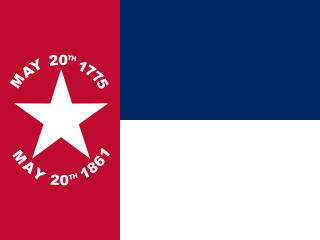
Barbara Ruth Arnwine served as the executive director of the Lawyers' Committee for Civil Rights Under Law from 1989 until 2015. Born in southern California, Arnwine is a graduate of Scripps College and Duke University School of Law. After graduating from Duke Law School, she stayed in Durham and worked for the Durham Legal Assistance Program and as a Reginald Huber Smith fellow. She moved on to the legal service's head office in Raleigh, North Carolina in 1979, working on affirmative action policies, reviewing contracts, and legal aid programs. In the 1980s she served as executive director of the Boston Lawyers' Committee for Civil Rights.
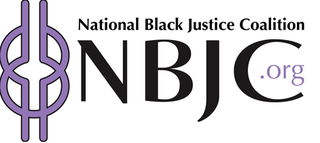
The National Black Justice Coalition (NBJC) is an American civil rights organization serving primarily Black lesbian, gay, bisexual, and transgender (LGBT) people. Since 2003, NBJC has collaborated with national civil rights groups and LGBT organizations, advocating for the unique challenges and needs of the African American LGBT community in the United States.
Rick Bowers is an American author and former newspaper journalist and editor. He wrote two non-fiction books published by National Geographic.

The social policy of the Donald Trump administration was generally socially conservative. As of 2016, Donald Trump described himself as pro-life with exceptions for rape, incest, and circumstances endangering the life of the mother. He said he was committed to appointing justices who may overturn the ruling in Roe v. Wade. Trump appointed three Supreme Court justices during his presidency. All of them later went on to vote in the majority opinion of Dobbs v. Jackson Women's Health Organization, the Supreme Court case overturning Roe v. Wade and ending federal abortion rights nationwide.
Sharon McGowan is an American lawyer and a partner at Katz Banks Kumin LLP, an employment and whistleblower firm based in Washington, D.C. Prior to joining KBK, she was the legal director and chief strategy officer for Lambda Legal. McGowan was an Obama administration appointee in the role of Acting General Counsel and Deputy General Counsel for Policy at the U.S. Office of Personnel Management. She also served as Principal Deputy Chief of the Appellate Section of the Civil Rights Division in the Department of Justice. In 2019, she was honored with the Stonewall Award, bestowed by the American Bar Association's Commission on Sexual Orientation and Gender Identity.

The George Floyd Justice in Policing Act of 2021 was a policing reform bill drafted by Democrats in the United States Congress. The legislation was introduced in the United States House of Representatives on February 24, 2021. The legislation aims to combat police misconduct, excessive force, and racial bias in policing.

Kristen M. Clarke is an American attorney who has served as the Assistant Attorney General for the Civil Rights Division at the United States Department of Justice since May 2021. Clarke previously served as president of the Lawyers' Committee for Civil Rights Under Law. She also managed the Civil Rights Bureau of the New York State Attorney General's Office under Eric Schneiderman. In 2019, Clarke successfully represented Taylor Dumpson, the first African American woman student body president of American University, in her landmark case against white supremacists.



